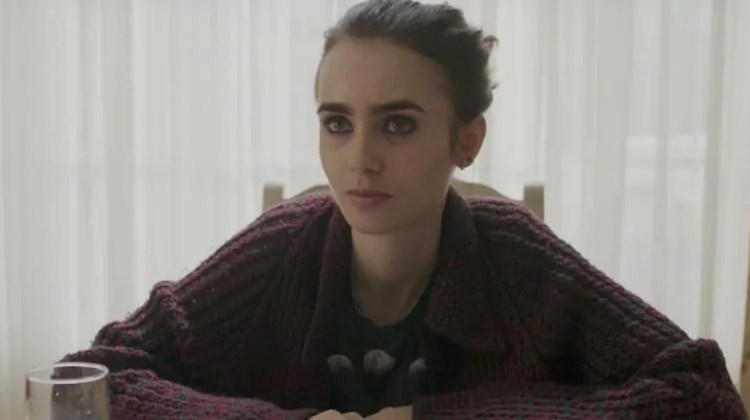Why ‘To The Bone’ was important to me
Netflix's new movie starring Lily Collins shouldn't be immediately written off
I guess this is an unpopular opinion, but I thought Netflix’s new movie ‘To The Bone’ did a good job.
‘To The Bone’ stars Lilly Collins as Ellen, a 20-year-old suffering with a severe eating disorder, and her unconventional therapist Dr. Beckham (Keanu Reeves). The movie hit Netflix on July 14, 2017 after it premiered back in January at the Sundance Film Festival.

Similarly to ‘13 Reasons Why‘, Netflix and the creators of ‘To The Bone’ took a lot of grief for choosing such a controversial topic as a theme for a film. Sometimes to me, it feels as if critics will slam any portrayal of mental health if somehow it doesn’t do everything in its power to fix the problem. Both ’13 Reasons Why’ and ‘To The Bone’ were heavily criticized for romanticizing mental illness, triggering viewers, and not educating viewers enough. But aren’t we asking a bit much of them?
I think ’13 Reasons Why’ actually does a good job of showing not only how the things you do to other people can have a snowball affect (including girl-on-girl bullying as well as boy-on-girl, which isn’t typically explored), but also how the people in your life suffer after you hurt yourself. Similarly, the reason ‘To The Bone’ resonates with me so much is because of its portrayal of how mental health disorders like anorexia affect the sufferer’s family.
Ellen’s stepmother comes off as dimwitted, overly chatty, and a bit naive—but she is the only one in Ellen’s life really advocating for her to get help. Ellen’s birth father never makes an appearance and skips out on family therapy, whereas Ellen’s birth mother repeatedly makes Ellen’s disorder all about herself rather than Ellen. Ellen’s birth mother’s new wife blames everyone else. When it comes to parenting someone with mental illness, I think these four characters display four common sides of the experience, and watching Ellen squirm in the family therapy circle while they argue over her speaks volumes.
In an article titled ‘To The Bone: Why Netflix’s Portrayal of Eating Disorders Has Got it All Wrong’, The Independent claims that the film actually trivializes anorexia. They say the movie’s themes “perpetuate the idea that girls can be ‘infected’ with anorexia by looking at images of very slim (or starved) bodies.” I don’t believe the film actually spends much time diving into why Ellen (or any of her fellow eating disorder sufferers) is anorexic. Instead, it focuses on what it’s like to maintain and create relationships when you’re in the grips of a mental health disorder and how to find happiness in life for yourself. Skipping the “why” part and even allowing the rexies (as the anorexic patients refer to themselves as) to make self-deprecating jokes shows how real they are.
Focusing on those sorts of themes probably doesn’t educate the public on how eating disorders begin and what causes them; I suppose The Independent is correct in that respect. But what it does do is make eating disorder sufferers human. It shows you their struggle, and it allows you relate to them. ‘To The Bone’ is not a documentary, and it wasn’t designed for psychology students. It’s a movie that allows the viewer to escape his or her own life and enter the world of someone else’s and hopefully, by doing so, learn a little bit about what it’s like to be them.
You suffer alongside Ellen. It shows her pain at hurting her family members, her struggle to date a boy, her quickly vanishing body mass as her condition worsened, her frustration at not being able to find the point in continuing on, the horrors some of the other patients suffered (feeding tubes, miscarriages)… What about that isn’t a realistic portrayal of an eating disorder? Where is the trivialization?
High Snobiety accuses ‘To The Bone’ of being tactless, saying, “Anorexia is not a life experience. It doesn’t show you what really matters or teach you how to love. It isn’t romantic, and it isn’t something that can be cured by the love of a good man.” They even go so far as to brand it a tragedy-porno. But as someone who has dealt with mental health disorders and lived with a family member who has as well, I beg to differ. These things are life experiences; I would go so far as to say claiming that they aren’t would be trivializing the disorder.
Declaring that movies like ‘To The Bone’ shouldn’t be made because they could cause recovering anorexics to relapse to me isn’t fair. When I found out there would be movies made about the Boston Marathon bombing, I was outraged at first. How dare they profit off my city’s suffering? How would the victims feel, or their families? But movies will always be made about tragedy, and they help the public come to terms with what happened.

Following Ellen’s tragic story as she hits rock bottom and ultimately rallies helps humanize eating disorder sufferers, and it also helps humanize those who are eating disorder adjacent. When Ellen’s sister speaks up in family therapy and explains how when she looks back on major life events (like her senior prom), all she associates them with is “the time Ellen fainted on the bus” or “the time Ellen started in-patient therapy,” it struck a chord with me. It helped alleviate some of my guilt for doing the exact same thing with my own sister.
I personally am grateful ‘To The Bone’ was made and Netflix picked it up. Movies and TV shows that cover difficult subjects like suicide and mental health disorders will always be controversial, and yes they do require a certain level of tact, but they’re important.
If you or someone you know is suffering from eating disorders, please visit Project Know to find out how to get help.
Featured Image Source


